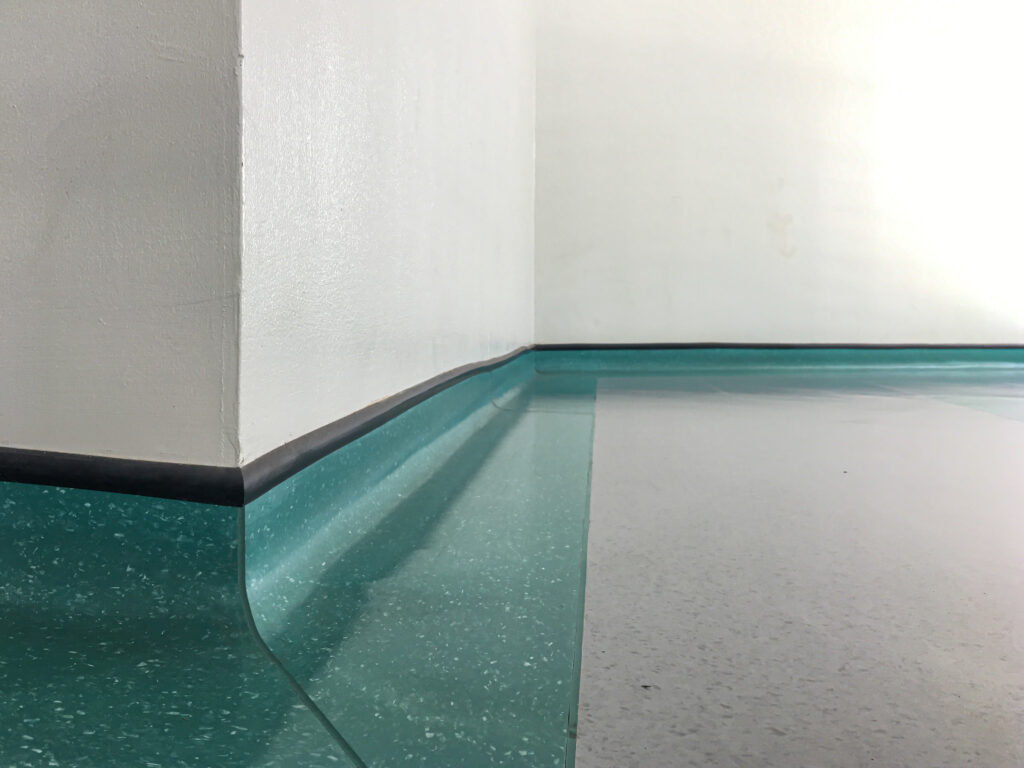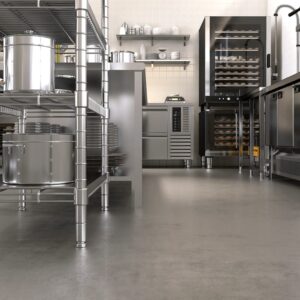It is essential to have hygienic flooring in environments where cleanliness is crucial, such as healthcare facilities, laboratories, and food manufacturing plants. Various industries, including healthcare, life sciences, biosciences, food and beverage manufacturing and veterinary services, require sterile and sanitised floors to maintain a healthy environment
In this guide will give you a complete understanding of hygienic flooring and tips on choosing one.
Types of hygienic flooring
With the right set of tools, any floor can be made hygienic. However, when we think about hygienic floors, the following five are the key ones to consider:
Vinyl flooring
Vinyl flooring is highly resistant to moisture and aesthetically appealing. It comprises multiple layers, each capable of being completely sealed off against liquid penetration. The core layer can either be rigid or flexible, and the wear layer protects against scratches and stains.
Its non-porous surface is crucial in maintaining a space’s hygiene. If properly cleaned, it can’t harbor bacteria or mould.
Due to their strengths, these floors are mostly found in hospitals and clinics. However, commercial kitchens and bathrooms also occasionally use these floors.

Laminate flooring
Developed from composite materials, laminate flooring has a photographic layer on top that mimics the look of wood or stone. Coated with a clear protective layer, it can resist scratches and moisture.
Due to its smooth surface, laminate flooring can be cleaned easily. This makes removing dirt firmer and ensures that the risk of allergen accumulation is low.
While it is not suitable for very wet areas, it is a good flooring to install in residential areas and offices.
Ceramic tiles
Those looking for a rugged look while maintaining the hygiene of their building should consider ceramic tile. Made from clay blended with other inorganic materials, ceramic tiles can be glazed for additional protection from moisture.
They are naturally resistant to humidity and work well when it comes to preventing mould and bacteria build-up.
They are suitable for wet areas specifically, so they are good to install in bathrooms, kitchens, and other regions where moisture is abundant.
Epoxy flooring
Epoxy flooring is not a flooring itself but a layer of synthetic resin hardened over a concrete floor. It is highly customisable, which makes it suitable for those who want to add more aesthetics to their home’s floors.
Adding epoxy to concrete makes the surface smoother, allowing people to disinfect it easily. Additionally, it is affordable.
Due to these features, epoxy flooring is best used in garages, warehouses, laboratories, and hospitals.
Rubber flooring
Rubber flooring is another good addition to hygienic flooring. Flexible, soft underfoot, and available in various forms such as tiles, rolls, and mats, it is easy to clean and has natural antimicrobial properties.
Resistant to most stains and spills, they are also elastic, making them strong against physical impacts.
They are good for places where impact resistance is a priority, such as gyms, playrooms, and schools.

How to choose the right hygienic flooring?
Here are the factors to consider when choosing hygienic flooring:
Moisture resistance
Bathrooms, kitchens, and basements require flooring that can tolerate high levels of moisture without warping or staining.
Durability
In regions with high traffic, it is important to install flooring that can withstand the pressure without getting degraded in terms of looks and functionality.
Ease of cleaning
Floors must be easy to clean, especially since they require maintenance every single day. Furthermore, these floors should be cleanable without using any specialised products.
Allergen resistant
Hospitals and laboratories are places susceptible to allergens. To reduce dust, people are required to install non-fibrous and non-porous flooring.
Antimicrobial properties
Some types of flooring have natural antimicrobial properties. Rubber flooring is a good example. It is smooth and flexible and prevents the accumulation of bacteria.
Chemical resistance
While it is important to maintain a floor’s hygiene, it is equally important to ensure that they are resistant to chemical damage. Places like hospitals and laboratories often require these types of floors.
Consider NJL Flooring when choosing hygienic flooring
Maintaining proper hygiene with flooring is crucial, especially in environments prone to bacterial contamination. NLJ Flooring offers high-quality hygienic flooring solutions to protect your business. Contact us today for assistance from our dedicated team.




